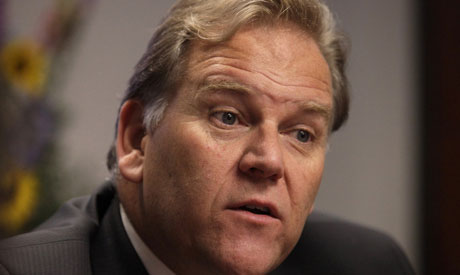
Chairman of the House Permanent Select Committee on Intelligence Mike Rogers speaks at the Reuters Cybersecurity Summit in Washington (Photo: Reuters)
US intelligence is better than in Europe, and snooping at the heart of a widening scandal helps keeps the world safe, a top US lawmaker declared Sunday amid a widening spying row.
House Intelligence Committee Chairman Mike Rogers also suggested there was nothing surprising in revelations that the United States was monitoring communications of several dozen world leaders and ordinary citizens, and blamed the news media for getting the story wrong.
"I think the bigger news story here would be... if the United States intelligence services weren't trying to collect information that would protect US interests both (at) home and abroad," the Republican told CNN's "State of the Union" program.
"We need to make sure that we're not collecting information we don't need. But we should collect information that is helpful to the United States' interests."
While declining to comment on the latest revelations, White House National Security Council spokeswoman Caitlin Hayden told AFP: "We have made clear that the United States gathers foreign intelligence of the type gathered by all nations."
Media reports in Germany on Sunday said that US President Barack Obama was personally informed of phone tapping against German Chancellor Angela Merkel, which may have begun as early as 2002, as the damaging espionage scandal widened.
Another German news report quoted US intelligence sources as saying that the head of the National Security Agency chief (NSA) briefed Obama on the operation against Merkel in 2010.
Dick Cheney, the former US vice president who wielded vast influence on intelligence matters during the George W. Bush administration's "war on terror," said US spying on allies was nothing new.
"It's something that we have been involved in a long time," he told ABC television's "This Week."
The spying row prompted European leaders late last week to demand a new deal with Washington on intelligence gathering that would maintain an essential alliance while keeping the fight against terrorism on track.
But Rogers said that French citizens would celebrate US phone intercepts in their country if they realized how the practice keeps them safe.
"If the French citizens knew exactly what that was about, they would be applauding and popping champagne corks. It's a good thing. it keeps the French safe. It keeps the US safe. It keeps our European allies safe," he added.
"This whole notion that we're going to go after each other on what is really legitimate protection of nation-state interest, I think is disingenuous."
Rogers called for improved intelligence oversight in European capitals, contrasting allies' approaches to the United States, where he stressed the government must first obtain approval from a special court to monitor communications.
European countries "don't have necessarily the same type of oversight of their intelligence services that we do," Rogers said.
"They need to have a better oversight structure in Europe. I think they would be enlightened to find out what their intelligence services may or may not be doing."
The Republican lawmaker said the news media was "100 percent wrong" in suggesting that the NSA monitored up to 70 million French telephone records in a single month.
"They're seeing three or four pieces of a 1,000-piece puzzle and wanted to come to a conclusion," he added, insisting the records collection was a counterterrorism program that did not target French citizens.
Rogers also suggested that US leaders failed to foresee the rise of fascism and communism in early 20th century Europe because American spies were not spying extensively on European allies' communications.
"In the 1930s, we had this debate before. We decided we were going to turn off our ability to even listen to friends," he said.
"Look what happened in the 30s, the rise of fascism and communism. We didn't see any of it. It resulted in the death of really tens of millions of people."
But the lawmaker stressed that any intelligence activities between allies should remain "respectful" and "accurate," as well as be subjected to proper oversight.
Short link: